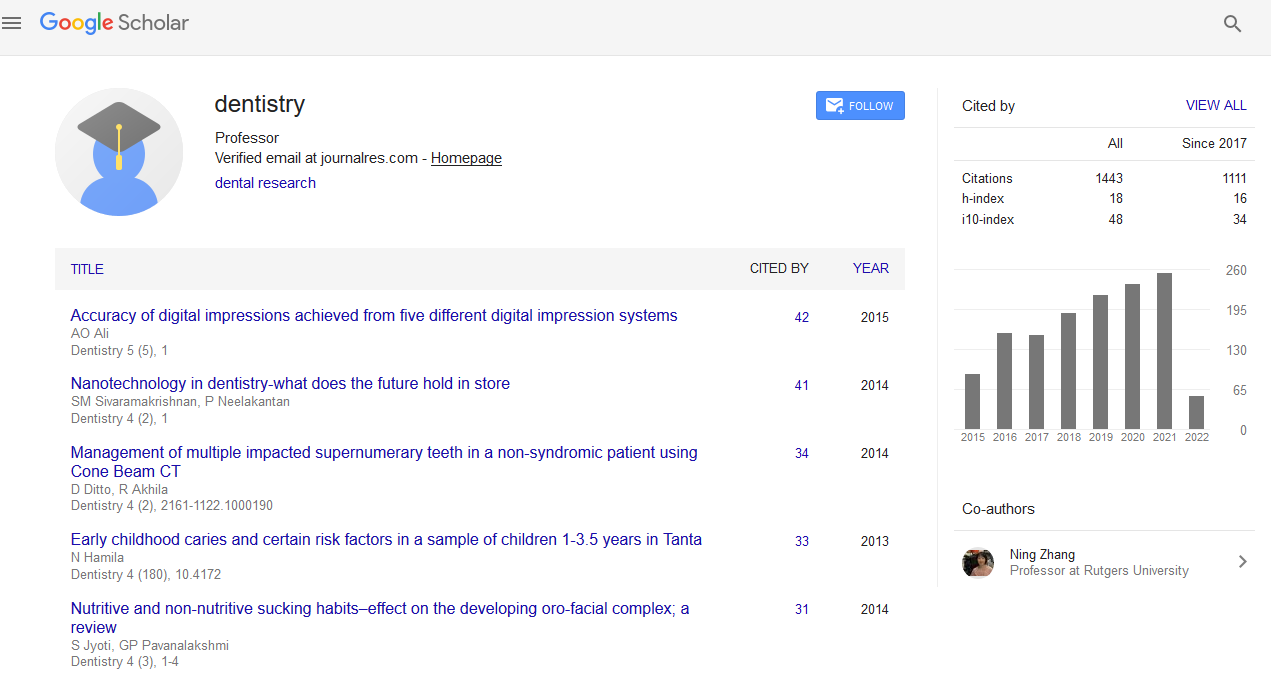Citations : 1817
Dentistry received 1817 citations as per Google Scholar report
Indexed In
- Genamics JournalSeek
- JournalTOCs
- CiteFactor
- Ulrich's Periodicals Directory
- RefSeek
- Hamdard University
- EBSCO A-Z
- Directory of Abstract Indexing for Journals
- OCLC- WorldCat
- Publons
- Geneva Foundation for Medical Education and Research
- Euro Pub
- Google Scholar
Useful Links
Share This Page
Journal Flyer

Open Access Journals
- Agri and Aquaculture
- Biochemistry
- Bioinformatics & Systems Biology
- Business & Management
- Chemistry
- Clinical Sciences
- Engineering
- Food & Nutrition
- General Science
- Genetics & Molecular Biology
- Immunology & Microbiology
- Medical Sciences
- Neuroscience & Psychology
- Nursing & Health Care
- Pharmaceutical Sciences
Exploring the versatility of gingiva-colored composite
30th International Conference on Dental Science & Advanced Dentistry
May 22-23, 2017 Las Vegas, USA
Sultan Ali Alanazi
Al-Farabi College for Dentistry and Nursing, Riyadh, Saudi Arabia
Posters & Accepted Abstracts: Dentistry
Abstract:
Gingival recession has a diverse etiology. The consequences may include gingivitis, periodontitis, and hypersensitivity. Whereas the management can include surgical treatment options, sometimes a more conservative, yet still esthetic approach may be required. The use of gingiva-colored composites provides one such alternative and can be applied to varying presentations of the problem. While surgical treatment can be successful in re-creating favorable esthetic anatomy as well as achieving accurate tissue contour in cases when minor amounts of tissue are reconstructed, long-term results vary because of the vascularity and complexity of the interdental space. Factors such as cost, healing time, discomfort, and variable long-term results make surgery an unpopular choice. If tooth-colored restorative materials are utilized to restore cervical tooth exposure as a result of severe recession, the disproportionate appearance of the visible crown may give a dissatisfying result. Gingiva-colored composite provides dental practitioners with a versatile material that can be used to directly restore cervical defects caused by gingival recession, thus correcting the appearance of the gingival anatomy. Resin-based composites and glass ionomer cements have been proven to produce positive results in treating class V lesions and associated gingival recession. Should further recession take place, additions of composite could be made to cover the resulting defect, although in such a case, serious consideration would need to be given to why the recession was progressing. Careful finishing of the margin of the gingival composite would be necessary to ensure that plaque trapping around the restoration did not contribute to this situation. It is confirmed clinically that composites have no adverse effects on gingival health, as well as that there is reduced inflammatory response to properly contoured and finished/polished composite resins in comparison to carious lesions that remain untreated
Biography :
Email: mr.night3@gmail.com


